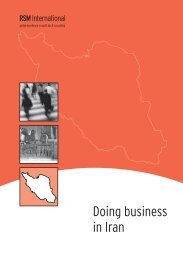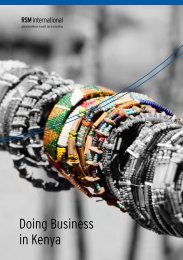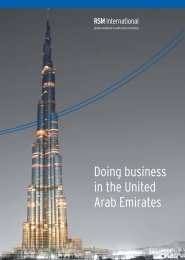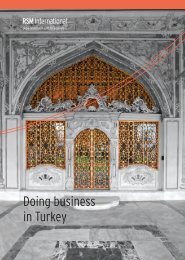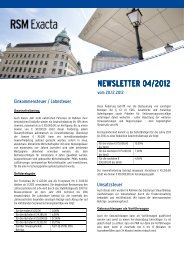Doing Business in France - RSM International
Doing Business in France - RSM International
Doing Business in France - RSM International
Create successful ePaper yourself
Turn your PDF publications into a flip-book with our unique Google optimized e-Paper software.
4.2 Company taxation<br />
Any foreign entity do<strong>in</strong>g bus<strong>in</strong>ess <strong>in</strong> <strong>France</strong> is liable to pay French tax on its earn<strong>in</strong>gs<br />
<strong>in</strong> <strong>France</strong>. This rule applies regardless of the types of entities (subsidiaries, branches<br />
or permanent establishment). Accord<strong>in</strong>g to the territoriality pr<strong>in</strong>ciple, activities that<br />
a French company carries on abroad through a foreign branch are, <strong>in</strong> pr<strong>in</strong>ciple, not<br />
subject to tax <strong>in</strong> <strong>France</strong>, except <strong>in</strong> the case where specific CFC rules apply.<br />
4.2.1 Taxable entities<br />
Liability to corporate tax may be either mandatory or optional. The most important<br />
entities subject to mandatory corporate tax liability are corporations (Société<br />
Anonyme, SA), simplified stock companies (Société par Actions Simplifiée, SAS),<br />
limited liability companies (Société à Responsabilité Limitée, SARL) and partnerships<br />
limited by shares (Société en Commandite par Actions, SCA).<br />
General partnership (Société en Nom Collectif, SNC) and silent partnership (Société<br />
En Participation, SEP) are excluded from the scope of corporate <strong>in</strong>come tax but may<br />
become subject to said tax if they so elect.<br />
Civil companies (Société civile, SC) are subject to corporate <strong>in</strong>come tax if they carry<br />
out a commercial activity. Otherwise, they are treated as transparent entities and are<br />
not subject to corporate <strong>in</strong>come tax unless they so elect.<br />
Foreign companies’ branches are, as a rule, subject to corporate <strong>in</strong>come tax.<br />
Entities that are not subject to corporate <strong>in</strong>come tax basically receive partnership<br />
treatment, mean<strong>in</strong>g that, as such, they are not considered as taxable entities. Each<br />
members of the partnership is subject to taxation accord<strong>in</strong>g to the regime applicable<br />
to itself (personal or corporate <strong>in</strong>come tax), on the portion of <strong>in</strong>come it derived from<br />
the entity.<br />
4.2.2 Tax assessment basis<br />
Any <strong>in</strong>come received, whether realized or accrued, needs to be taken <strong>in</strong>to account<br />
when comput<strong>in</strong>g the taxable profits. Apart from the participation exemption on<br />
dividends and capital ga<strong>in</strong>s, there are no significant corporate tax exemptions.<br />
A dist<strong>in</strong>ction must be made between the three ma<strong>in</strong> types of expenses: general<br />
expenses, depreciation and provisions.<br />
24 | DOING BUSINESS IN FRANCE



